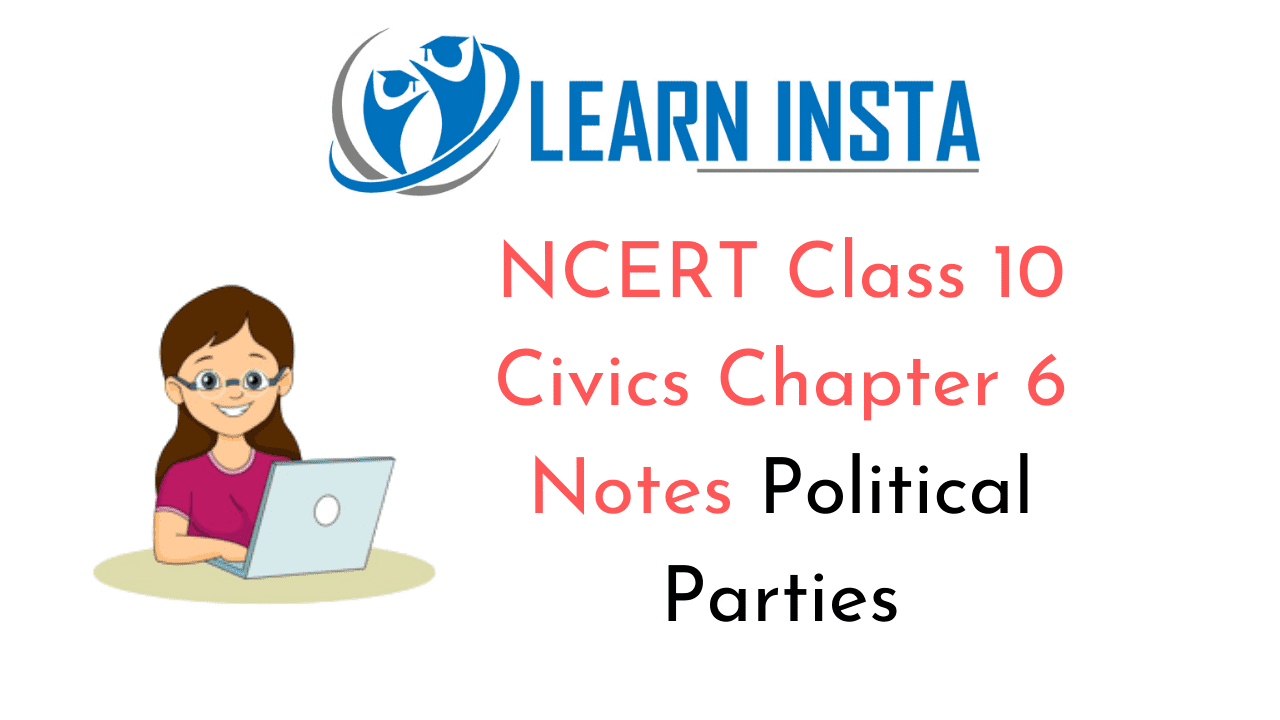 On this page, you will find NCERT Class 10 Civics Chapter 6 Notes Pdf free download. CBSE Class 10 Social Science Notes Civics Chapter 6 SST Political Parties will seemingly, help them to revise the important concepts in less time.
On this page, you will find NCERT Class 10 Civics Chapter 6 Notes Pdf free download. CBSE Class 10 Social Science Notes Civics Chapter 6 SST Political Parties will seemingly, help them to revise the important concepts in less time.
Political Parties Class 10 Notes Social Science Civics Chapter 6
CBSE Class 10 Civics Chapter 6 Notes Understanding the Lesson
1. Political parties play an important role in the rise of democracies, in the formation of constitutional designs, in electoral politics and in the making and working of governments.
2. A political party is a group of people who come together to contest elections and hold power in the government. They agree on some policies and programmes for the society with a view to promote the collective good.
3. A political party has three components – the leaders, the active members, and the followers. Political parties perform several functions – they contest elections, they put forward different policies and programmes, they form and run governments, they shape public opinion, etc.
4. Modern democracies cannot exist without political parties. In a democracy, any group of citizens is free to form a political party. In India, more than 750 parties are registered with the Election Commission. But not all parties are serious contenders in the elections.
5. We can find one-party system in some countries. But this is not a democratic option. Any democratic system must allow at least two parties to compete in elections and provide a fair chance for the competing parties to come to power.
6. There are some countries where power usually changes between two main parties. Such a party system is called two-party system. But there is also a multi-party system in many countries. In this system, the government is formed by various parties coming together in a coalition. India is the best example of a multi-party system.
7. Party system is not something any country can choose. It evolves over a long time, depending on the nature of society, its social and regional divisions, its history of politics and its system of elections. However, no system is ideal for all countries and all situations.
8. National parties are country-wide parties. These parties have their units in various states. They are expected to secure at least six per cent of the total votes in Lok Sabha elections or Assembly elections in four states and win at least four seats in the Lok Sabha.
9. There were six national parties in the country in 2006 – Indian National Congress (INC), Bharatiya Janata Party (BJP), Bahujan Samaj Party (BSP), Communist Party of India-Marxist (CPI-M), Communist Party of India (CPI) and National Congress Party (NCP).
10. State parties, also known as regional parties, are expected to secure at least six per cent of the total votes in an election to the Legislative Assembly of a state and win at least two seats. Some of the state parties are – Rashtriya Lok Dal, Samajwadi Party, Janata Dal (U), Telugu Desam, Manipur People’s Party etc.
11. People blame political parties if there is any wrong with the working of democracy. They express strong dissatisfaction with their failure to perform their functions well.
12. Political parties face several challenges. Some of them are lack of internal democracy within parties, challenge of dynastic succession, challenge of growing role of money and muscle power in parties, etc.
13. In order to overcome these challenges, political parties need to be reformed. Some of the recent efforts in our country to reform political parties and its leaders are-anti-defection law has been passed, the Supreme Court has passed an order to reduce the influence of money and criminals, the Election Commission has passed an order making it necessary for political parties to hold their organisational elections and file their income tax returns, etc.
14. Some suggestions have also been given to reform parties – a law should be made to regulate the internal affairs of political parties, there should be state funding of elections, it should be made mandatory for political parties to give a minimum number of tickets, about one-third to women candidates, etc.
15. There are two other ways in which political parties can be reformed. One, people can put pressure on political parties. Two, political parties can improve if those who want this join political parties.
16. Public participation is essential if we want to improve the quality of democracy.
Political Parties Class 10 CBSE Notes Important Terms
Partisan: A person who is strongly committed to a party, group or faction.
Ruling party: Political party that runs the government.
Opposition party: Political party that is opposed to the government.
Political party: A group of people who come together to contest elections and hold power in the government.
Defection: Changing party allegiance from the party on which a person got elected (to a legislative body) to a different party.
Affidavit: A signed document submitted to an officer, where a person makes a sworn statement regarding his/her personal information.
Leftist: They argue that not every individual is the same and so government policy should be aimed to create substantial rather than just formal equality.
Rightist: They believe that governments are big and unwieldy and so should not interfere with people’s lives at all. They believe in formal equality.